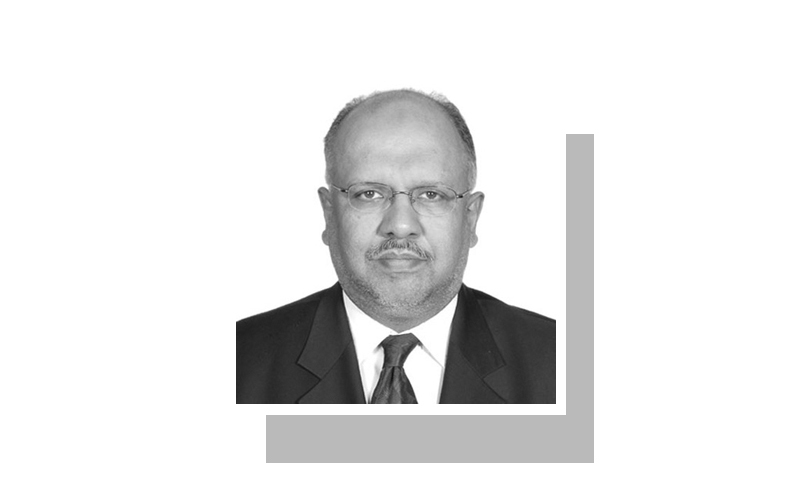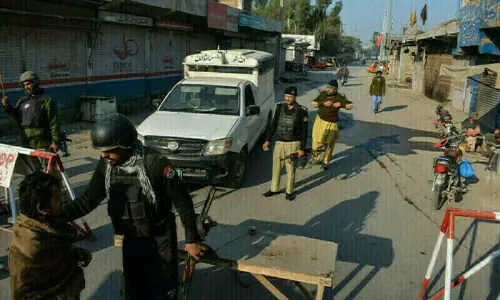IS the worst political challenge facing Nawaz Sharif now behind him? That is the question making the rounds across Pakistan’s political gossip rooms with the departure of Tahirul Qadri’s ‘dharna’ from Islamabad, leaving Imran Khan behind as the sole dissident leader outside parliament.
But a close review of trends across the political spectrum since Sharif’s political victory in 2013 reveals more concerns.
The hype which surrounded high-level promotions inside the Pakistan Army some time ago gave a telling account of the failure of ruling politicians to take charge.
For instance, ahead of the promotions, there had been speculation for weeks in Islamabad’s political corridors over exactly who would take charge of the powerful intelligence agency ISI. Though the latter remains a vital centrepiece in Pakistan’s security apparatus, added speculation mounted regarding the promoted military men.
Our rulers have failed to establish a bold new footprint.
Welcome to the not so new Pakistan. More than six years after retired Gen Pervez Musharraf stepped down to give way to an elected civilian political order, Pakistan’s ruling elite remains captive to the narrative of yesteryears dominated by a political order run by the security establishment.
In the past year, ruling politicians have failed to conclusively establish a bold new footprint that in time could have earned space for elected public representatives.
Instead, a visibly stubborn complacency with regard to a badly needed policy shift has only caused the failure of Islamabad’s rulers to begin taking charge where it matters the most.
Should anyone, therefore, be surprised that the security establishment’s footprint remains well in place on key aspects of security and foreign policy — the two areas where politicians appear to have virtually abdicated responsibility?
Consequently, the failure to mark a transition from the days of an army-run order to a civilian-led one, must have across-the-board repercussions in other areas too.
Going forward, it’s hardly surprising that while Pakistan’s society has embraced a democratic culture, thanks in large part to an increasingly vibrant print and electronic media in tandem with an increasingly emancipated civil society, the feeling of change is not so apparent in Islamabad’s political corridors.
Indeed, the crisis that engulfs Pakistan today not only needs unprecedented national unity in key areas. More vitally, salvation will only come when the political masters placed in Islamabad move beyond agents of change to become leaders of change. Their ability to take charge of Pakistan and allow a sense of long-term certainty will depend in part on clearing the air with the security apparatus.
And yet, the prime minister remains captive to his own past. The government’s refusal to benefit from opportunities to allow the former army chief Pervez Musharraf to travel abroad, only points towards a failure to rise beyond personal whims and appreciate what is required to build a badly needed new Pakistan.
Besides this discord, other telling failures to carve out a new and qualitatively improved outlook for Pakistan, have indeed undermined the political space gained by Pakistan’s still fragile democratic order.
In sharp contrast to the oft-repeated pat-on-the-back type of claims by Finance Minister Ishaq Dar, claiming a hitherto not-so-visible economic recovery about to sweep Pakistan, the evidence on the ground points to the contrary.
In Islamabad, ruling politicians during their year in office appear to have done little to lead a badly needed comprehensive debate in parliament on matters related to popular interests.
While there are all too many instances of support for the official narrative backing fancy new infrastructure projects, there is little that can be called a robust national effort to either reform Pakistan’s badly defunct educational system or its crisis-stricken public health establishments.
These matters are not just among the central gaps in the track record of the ruling structure. Notably, they also point towards a failure to begin a policy correction course which in time would sustain Pakistan’s democracy and strengthen it further.
Meanwhile, the continuing public display of political discontent across the country must be seen as an all-too-visible sign of popular disapproval with the way Pakistan is being run.
The growing intensity of political activities such as the work of Islamabad’s ‘dharna’ crowd has only sparked an increasingly discussed question: is the stage being set for mid-term elections? For many, there is an obviously troubling long-term question brought once again to the fore.
With the ruling structure’s unimpressive track record of the past year, should anyone be surprised over the security establishment continuing to figure centrally in the mind of many sections of the public as the only institution that holds Pakistan together?
What could be a bigger tragedy for the ultimate fate of Pakistan’s hard-earned democratic space, is a valid question.
The writer is an Islamabad-based journalist.
Published in Dawn, November 4th, 2014
































